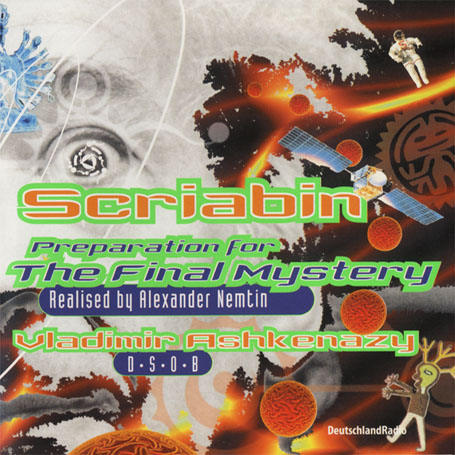Scriabin/Nemtin Mysterium
Megalomania or genius? Scriabin's contemplation of the end of existence enjoys the advocacy of Ashkenazy in Nemtin's fascinating realisation
View record and artist detailsRecord and Artist Details
Composer or Director: Alexander Scriabin
Label: Decca
Magazine Review Date: 4/2000
Media Format: CD or Download
Media Runtime: 190
Mastering:
DDD
Catalogue Number: 466 329-2DH3

Tracks:
| Composition | Artist Credit |
|---|---|
| Preparation for The Final Mystery |
Alexander Scriabin, Composer
Alexander Ghindin, Piano Alexander Scriabin, Composer Alexei Lubimov, Piano Anna-Kristiina Kaappola, Soprano Berlin Deutsches Symphony Orchestra Ernst Senff Chorus St Petersburg Chamber Choir Thomas Trotter, Organ Vladimir Ashkenazy, Conductor |
| Nuances |
Alexander Scriabin, Composer
Alexander Scriabin, Composer Berlin Deutsches Symphony Orchestra Vladimir Ashkenazy, Conductor |
Author: kYlzrO1BaC7A
The grandiose vision bar none, Mysterium, Scriabin's week-long Himalayan extravaganza, now seems more ridiculous than sublime; not so much a world-enlightening experience as the Book of Revelation adapted for the Dome. Scriabin himself had doubts about the enterprise; hence the 'Preliminary Action' he worked on during 1912-13, as a preparation for whatever was to come. Yet at his death in 1915, only 53 pages of sketches remained as testament to his ambitions. Not until 1970 were they studied and worked on in earnest, when Alexander Nemtin embarked on a realisation that would extend over 26 years, effectively sacrificing his own composing career in the process.
What we have is a three-part, cumulative exploration of Scriabin's musical ethos, playing for 156 minutes and employing much the same forces, down to the 'colour keyboard', of his final orchestral statement Prometheus. Indeed, the opening part, 'Universe' (recorded in 1973 and guardedly reviewed in these pages), comes disconcertingly close to the musical substance and dynamic contours of that piece. It's not just that identical motifs and chord progressions are brought into play, but an already dense, torrid sound world is stretched beyond meaningful limits.
Yet the realisation gains in conviction as it proceeds, largely through Nemtin's resourceful and imaginative treatment of the sketch material. Part 2, 'Mankind', features subtle, dance-like passages of surprising harmonic clarity (try track 2 from 8'30'' and the opening minutes of track 6), while Part 3, 'Transfiguration', gradually draws together the myriad thematic threads in a spectacular yet logical implosion onto a unison F sharp: the ending of Scriabin's vision is thus made its beginning.
If, in the last resort, Scriabin imitating God is less convincing than the purely musical perfection of his late sonatas and piano pieces, this is not to criticise Nemtin's dedication to the impossible; a dedication reinforced by Nuances, his 1975 ballet after Scriabin's late piano pieces. Its distilled eroticism would make a striking adjunct to Bartok's Miraculous Mandarin and Stravinsky's Orpheus, as part of a provocative triple-bill.
Performances are committed and often magnificent-sounding. Taking on the main work's demanding concertante piano part once again, Alexei Lubimov is unfailing in his advocacy, while Ashkenazy achieves an intensity so often lacking in his recordings of the symphonies. Informatively annotated and garishly packaged, 'Preparation for The Final Mystery' is one millennial experience whose very ambition is part of its attraction.'
What we have is a three-part, cumulative exploration of Scriabin's musical ethos, playing for 156 minutes and employing much the same forces, down to the 'colour keyboard', of his final orchestral statement Prometheus. Indeed, the opening part, 'Universe' (recorded in 1973 and guardedly reviewed in these pages), comes disconcertingly close to the musical substance and dynamic contours of that piece. It's not just that identical motifs and chord progressions are brought into play, but an already dense, torrid sound world is stretched beyond meaningful limits.
Yet the realisation gains in conviction as it proceeds, largely through Nemtin's resourceful and imaginative treatment of the sketch material. Part 2, 'Mankind', features subtle, dance-like passages of surprising harmonic clarity (try track 2 from 8'30'' and the opening minutes of track 6), while Part 3, 'Transfiguration', gradually draws together the myriad thematic threads in a spectacular yet logical implosion onto a unison F sharp: the ending of Scriabin's vision is thus made its beginning.
If, in the last resort, Scriabin imitating God is less convincing than the purely musical perfection of his late sonatas and piano pieces, this is not to criticise Nemtin's dedication to the impossible; a dedication reinforced by Nuances, his 1975 ballet after Scriabin's late piano pieces. Its distilled eroticism would make a striking adjunct to Bartok's Miraculous Mandarin and Stravinsky's Orpheus, as part of a provocative triple-bill.
Performances are committed and often magnificent-sounding. Taking on the main work's demanding concertante piano part once again, Alexei Lubimov is unfailing in his advocacy, while Ashkenazy achieves an intensity so often lacking in his recordings of the symphonies. Informatively annotated and garishly packaged, 'Preparation for The Final Mystery' is one millennial experience whose very ambition is part of its attraction.'
Discover the world's largest classical music catalogue with Presto Music.

Gramophone Digital Club
- Digital Edition
- Digital Archive
- Reviews Database
- Full website access
From £8.75 / month
Subscribe
Gramophone Full Club
- Print Edition
- Digital Edition
- Digital Archive
- Reviews Database
- Full website access
From £11.00 / month
Subscribe
If you are a library, university or other organisation that would be interested in an institutional subscription to Gramophone please click here for further information.




